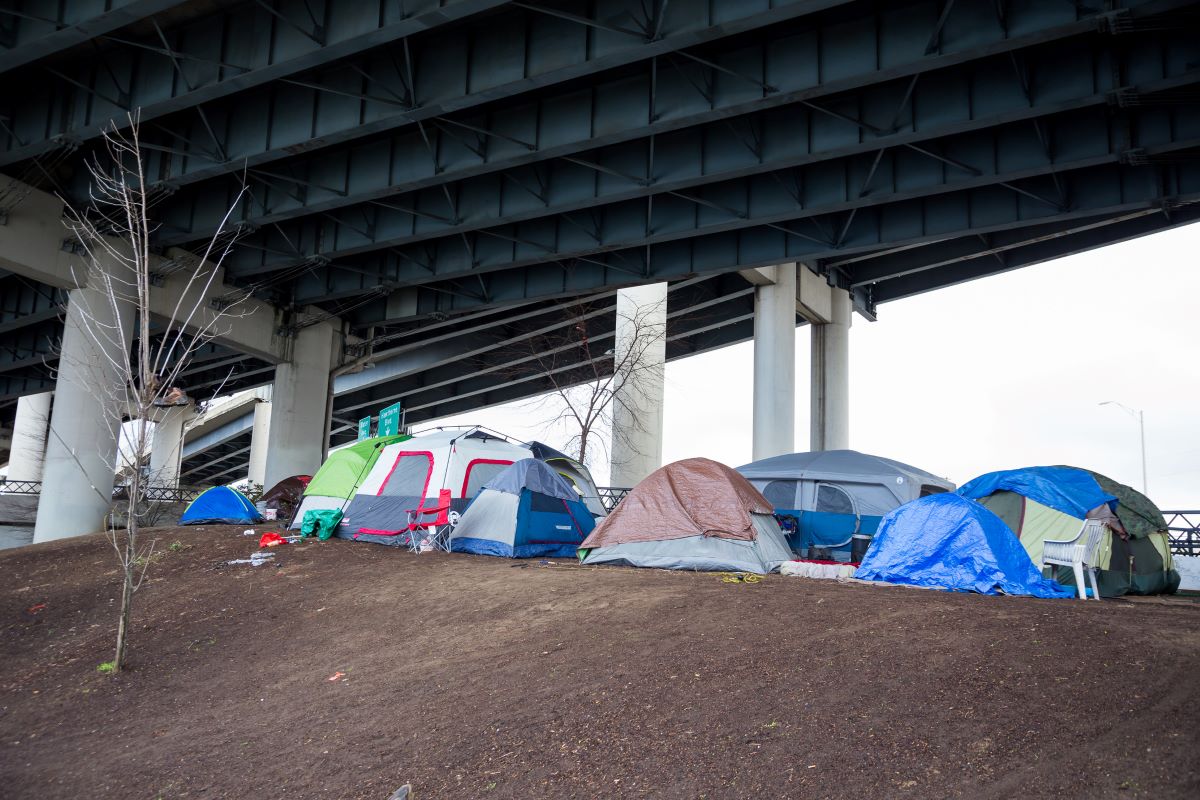Oregon lawmakers killed a bill on May 2 that would have decriminalized homeless encampments and allowed unhoused folks to sue for up to $1,000 if they were harassed or told to move along.
The bill, House Bill 3501, is known as the “Right to Rest” bill among advocates for the unhoused. Rep. Farrash Chaichi, a Democrat from Beaverton, sponsored it.
“Many persons in Oregon have experienced homelessness as a result of economic hardship, a shortage of safe and affordable housing, the inability to obtain gainful employment, and a disintegrating social safety net system,” Chaichi said. “Decriminalization of rest allows local governments to redirect resources from local law enforcement activities to activities that address the root causes of homelessness and poverty.”
So-called “Right to Rest” bills have cropped up in western state legislatures ranging from Colorado to California as rates of homelessness continue to increase, especially among unsheltered populations. However, these bills have received consistent pushback from residents who argue that the bills strip them of their ability to use public lands.
‘Right to Rest’ Public Hearing Canceled Due to Significant Opposition
In Oregon, lawmakers canceled a public hearing set for May 4 about HB-3501 because of the bill’s significant opposition. Out of the hundreds of testimonies submitted to Oregon’s House Committee On Housing and Homelessness about the bill, just 45 were in support of the bill. Another 48 testimonies were labeled “neutral” on the bill, while more than 100 were opposed.
Residents who oppose the bill, like Maryann West, who lives in Central Point, said the legislation could create more problems than it intends to solve.
“It is not in the best interest of all of us as members of our communities to be put in a place where we feel unsafe and without the ability to do anything about the situation if we find ourselves with someone who has chosen to take up a space perhaps in front our homes where our babies want to go outside to play without fear or to see someone peeing right on our neighborhood sidewalk which is unsafe and unhealthy for our kids and for us as well,” West wrote in her testimony.
Residents who support the bill, like Dorothy Swain from Grants Pass, say it would undo some of the “shameful” ways that Oregon’s unhoused are treated.
“Everyone has the right to dignity and freedom in public spaces,” Swain said. “It is not a crime to be poor.”
Ways to Lift Up Homeless Neighbors
Rep. Khanh Pham, a Democrat representing southeast Portland and one of HB-3501’s co-sponsors, said she plans to hold “more public dialogue sessions” about sweeps, maintaining public spaces, and the criminalization of homelessness after the legislative session.
“While I support the important conversation around how we lift up our homeless neighbors, I am devoting my limited time in the remainder of session to working on bills that are still alive and advocating for a state budget that can respond to what we’re seeing on our streets,” Kahn told the news station.
‘Right to Rest Bill’ Fails Again While Unsheltered Homelessness Increases by 50%
This was the second time the “Right to Rest” bill failed to pass in Oregon’s left-leaning legislature. A previous version of the bill was introduced in 2021 but failed to make it out of the state’s judiciary committee.
The bill’s failure comes at a pivotal time for Oregon’s unhoused as well. The latest one-night count data shows that homelessness in Multnomah County, which includes Portland, has increased by 30.2% since the pandemic began in March 2022. Meanwhile, unsheltered homelessness has ballooned by more than 50%.
Meanwhile, home prices and rent increases threaten housing stability for many of the state’s low-income earners. Statewide, the median home price has increased by 29.2% from more than $386,000 in March 2020 to $486,000 in March 2023, according to Redfin.
The average rent for a one-bedroom apartment in the state is expected to jump from $1,500 to about $1,719 despite the state’s statutory cap on rent increases.
The courts have also ruled that cities violate the Eighth Amendment if they punish unhoused folks and do not have enough shelter beds. In 2021, the 9th District Court, including Oregon, ruled that an ordinance in Boise, Idaho, that banned people from sleeping in public was unconstitutional because the city lacked adequate shelter options.
How You Can Help
Handcuffs will never solve homelessness. The pandemic proved that we need to rethink housing in the United States. It also showed that many programs designed to address homelessness are rooted in law enforcement rather than social services.
Tell your representatives you support revamping how your city addresses homelessness. Handcuffs do not get anyone closer to stable housing. Instead, we must focus on compassionate solutions, the first step to ending homelessness.













